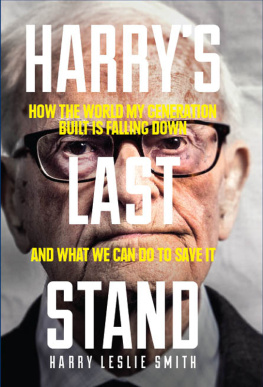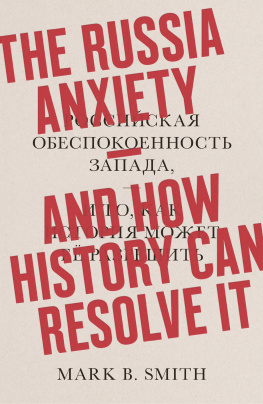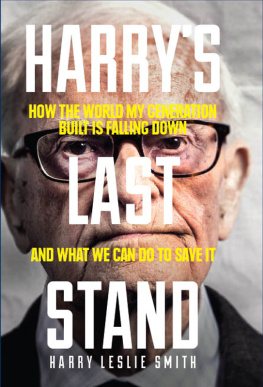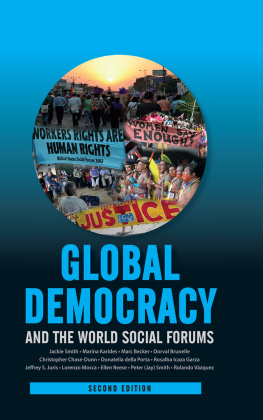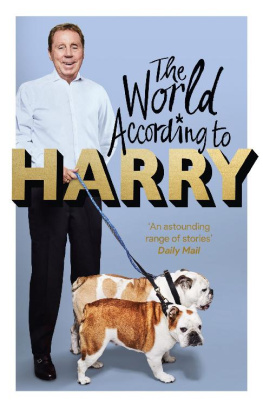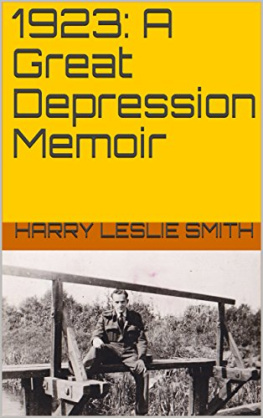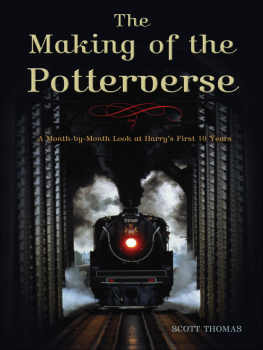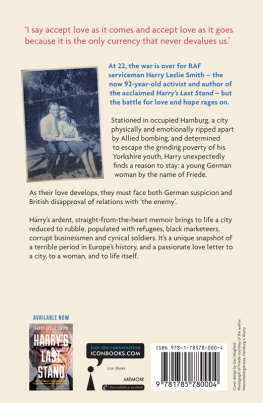HARRYS
LAST
STAND
HARRYS
LAST
STAND
HOW THE WORLD MY GENERATION BUILT IS FALLING DOWN, AND WHAT WE CAN DO TO SAVE IT
HARRY LESLIE SMITH

Published in the UK and USA in 2014 by
Icon Books Ltd, Omnibus Business Centre,
3941 North Road, London N7 9DP
email:
www.iconbooks.com
Sold in the UK, Europe and Asia
by Faber & Faber Ltd, Bloomsbury House,
7477 Great Russell Street,
London WC1B 3DA or their agents
Distributed in the UK, Europe and Asia
by TBS Ltd, TBS Distribution Centre, Colchester Road,
Frating Green, Colchester CO7 7DW
Distributed in Australia and New Zealand
by Allen & Unwin Pty Ltd,
PO Box 8500, 83 Alexander Street,
Crows Nest, NSW 2065
Distributed in South Africa by Jonathan Ball,
Office B4, The District, 41 Sir Lowry Road,
Woodstock 7925
Distributed in Canada by Penguin Books Canada,
90 Eglinton Avenue East, Suite 700,
Toronto, Ontario M4P 2Y3
Distributed to the trade in the USA
by Consortium Book Sales and Distribution
The Keg House, 34 Thirteenth Avenue NE, Suite 101,
Minneapolis, MN 55413-1007
ISBN: 978-184831-726-0
Text copyright 2014 Harry Leslie Smith
The author has asserted his moral rights.
No part of this book may be reproduced in any form, or by any
means, without prior permission in writing from the publisher.
Typeset in MT Bell by Marie Doherty
Printed and bound in the UK by
Clays Ltd, St Ives plc
To my Mum and Dad
Albert and Lillian
Who lived and tried to love in a time of austerity
I said: What is past shall be no more, shall be no more!
But lo! They have started to stir again
Alexander Pushkin
Prologue
I remember how peace smelled on that day in May 1945. Of lilac, petrol and the rotting flesh of the dead German civilians entombed beneath the fire-bombed city of Hamburg. I was 22 years old. After four years of fighting with the RAF, I had survived and been given the chance to grow old and die in my bed. It was a day to weep for those that had been lost but also to dance and celebrate life, to drink to our good fortune.
There has not been a day in the last 60 years when I have not thought of how lucky I was. However, as I have grown older, I am no longer certain that the sacrifice my generation paid with their blood was worth the cost. Back then the people of Britain stood strong, unwilling to surrender to the tyranny of fascism, despite unimaginable civilian casualties and privations caused by the bombing that laid waste to our cities and industries. Our armed forces, comprised of boys from every compass point on our island, knew that their lives might be wagered and their futures extinguished so that our nation, our way of life, might endure. Young lads became men in the desperate clash between civilisation and barbarism.
After six years of total war, millions of casualties, millions of dead, millions of maimed lives, Britain and her allies were victorious against the scourge of Nazism. But that is not the end of the story. My generations resolve to create a more equal Britain a more liberal world for our children to grow up in, where merit mattered and the class system was history was set on the battlefields of Europe.
In November, when our nation remembers her fallen soldiers and honours the lost youth of my generation, the Prime Minister, government leaders and the hollow men of business affix paper poppies to their lapels and afford the dead of war two minutes silence. Afterwards, they speak golden platitudes about the struggle and the heroism of that time. Yet the words they speak are meaningless because they have surrendered the values my generation built after the horrors of the Second World War.
We fought in tank battles in the Sahara. We defended the skies over Britain in dogfights with the Luftwaffe. Our navy engaged in a life-or-death conflict in the battle of the north Atlantic to preserve our dominion over the seas. We were compelled to invade the armed fortress of Europe on the beaches of Normandy. In desperate battle we fought the Germans from village to town through spring and summer in our bid to liberate France. As autumn turned to winter our armies, along with those of our allies, formed a united front that pushed through the lowlands of Belgium and Holland. Those final months of conflict were intense, brutal and bloody but we buggered on until we were in the heart of Germany and on the road to Berlin and victory.
When we accepted rationing and the lack of decent housing during the post-war period of reconstruction, it was because after the bloodshed we were all focussed on building something better for everyone. And for a while it seemed that the enthusiasm that blossomed in Britain, America, France and Canada for the creation of thriving societies for the poor, the working classes, the middle classes and the wealthy would endure. It seemed genuinely possible to create nations that combined social justice with economic mobility for every citizen.
But it didnt last. By the 1970s the British economy, as well as its society, was under serious threat from inflation, weak Labour governments that werent able to stabilise the nations finances or control the chaos and misery that average citizens endured from an endless array of industrial strikes. In that tumultuous decade it felt like the United Kingdom had lost the plot and overreached itself in its desire to build a just society through financial stability and fair play to both worker and employer. Picket lines formed like flash mobs out of nowhere and for no apparent reason. At any given moment lorry drivers, coal miners, grave diggers or refuse collectors were on the streets demanding wage settlements that were meant to offset the horrendous cost-of-living crisis caused by inflation. However, for those who were not protected by a union it smacked of an Im all right, Jack attitude.
The 1970s were a tumultuous decade for the worlds economies, but the rot really started to seep into Western democratic nations in the 80s, after the oil crisis and years of hyperinflation and chronic labour unrest. To my mind, the edifice of our civilised states started to crumble the day Ronald Reagan talked about the shining city on the hill that could be built without taxes, and when Margaret Thatcher said that come what may she would not be turned, no matter how many tears were spilled in her destruction of those who protected workers rights. Those that had never experienced it began to talk about a golden age when taxes were low and opportunities were always available for hard workers, while the lazy perished in their own sloth.
In two short generations the tides of corporatism without conscience began to roll in and washed away the blood, sweat and tears of a hundred years of industrial workers rights. Now, a nation that once had the courage to refigure society, to create the NHS and the modern welfare state, elects governments that are in lock-step with big business whose overriding pursuit is profit for the few at the expense of the many. We have gone from a nation that defied Hitler while the rest of Europe lay subjugated under his boot to a country that is timorous around tycoons and their untaxed offshore wealth.
These technocrats and human resource experts have reversed my generations struggle to close the gap between the richest and the poorest. They have betrayed our dream of an equitable society with medical care, housing and education for all. They have allowed it to be taken to pieces and sold off to the lowest bidder, and broken their pledge to protect democracy and the freedoms due to every citizen in this country. This cannot be allowed to happen in respectful silence. Too many good people died. Too many sacrificed their lives for ideals that have been too quickly forgotten.
Next page
